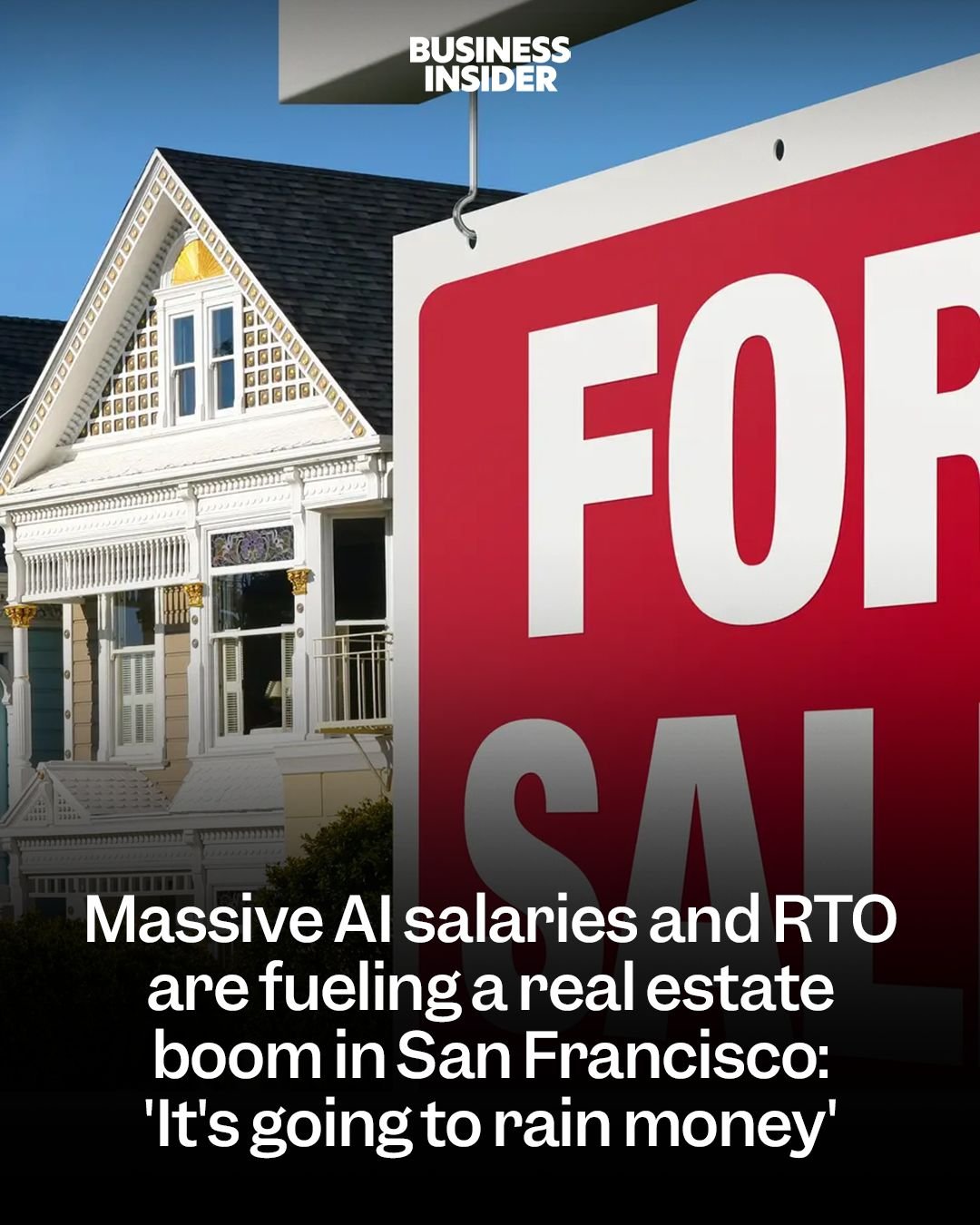Business
#siliconvalley #realestate #ai | Business Insider

The AI boom has lit a fuse under San Francisco’s housing market, with prices and rents inflamed by a tech workforce increasingly returning to the office, and as the AI talent wars push salaries to dizzying highs.
Tech workers are flocking to the Bay Area to work at OpenAI, Anthropic, and Nvidia after the region was dealt a massive blow during the COVID-19 pandemic. Real estate agents say RTO is fueling the resurgence, with AI being particularly synonymous with in-person work and hardcore culture.
What’s more, tech workers, especially those working in AI, are commanding massive salaries, including multimillion-dollar compensation packages.
Read more about this real estate boom on Business Insider: https://lnkd.in/eXhNxYbY
(Credit: Getty Images/iStockphoto)
#siliconvalley #realestate #ai
Business
Microsoft AI CEO: Giving AI Rights Is ‘Dangerous and Misguided’

AI systems may feel real, but they don’t deserve rights, said Microsoft’s AI CEO.
Mustafa Suleyman said in an interview with WIRED published Wednesday that the industry needs to be clear that AI is built to serve humans, not to develop independent will or desires.
“If AI has a sort of sense of itself, if it has its own motivations and its own desires and its own goals — that starts to seem like an independent being rather than something that is in service to humans,” he said. “That’s so dangerous and so misguided that we need to take a declarative position against it right now.”
The former DeepMind and Inflection cofounder pushed back against the idea that AI’s increasingly convincing responses amount to genuine consciousness. It’s “mimicry,” he said.
He also said that rights should be tied to the ability to suffer — something biological beings experience but AI does not.
“You could have a model which claims to be aware of its own existence and claims to have a subjective experience, but there is no evidence that it suffers,” he said.
Humans don’t owe them any moral protection or rights. “Turning them off makes no difference, because they don’t actually suffer,” he added.
AI as sentient beings
Suleyman’s comments come as some AI companies explore the opposite: whether AI deserves to be treated more like sentient beings.
Anthropic has gone further than most companies in treating AI systems as if their welfare matters. The company has hired a researcher, Kyle Fish, whose role is to consider whether advanced AI might one day be “worthy of moral consideration.”
His job involves exploring what capabilities an AI system would need before earning such protection, and what practical steps companies could take to safeguard the “interests” of AI, Anthropic told Business Insider last year.
Anthropic has also recently experimented with how to end extreme conversations — including child exploitation requests — in ways that extend “welfare” considerations to the AI itself.
In April, a principal scientist at Google DeepMind said the industry might need to rethink the concept of AI consciousness altogether.
“Maybe we need to bend or break the vocabulary of consciousness to fit these new systems,” Murray Shanahan said on a Deepmind podcast published in April. “You can’t be in the world with them like you can with a dog or an octopus — but that doesn’t mean there’s nothing there.”
Suleyman previously said that there is no evidence that AI is conscious.
In a personal essay published last month, he wrote that he was “growing more and more concerned” about so-called AI psychosis, a term increasingly being used to describe when people form delusional beliefs after interacting with chatbots.
Suleyman and Microsoft did not respond to a request for comment from Business Insider.
Business
Robinhood CEO Says AI Won’t Fully Take Over Trading

AI isn’t ready to take over all the human aspects of trading, said Robinhood’s CEO.
In an interview with Bloomberg Wealth released on Wednesday, Vlad Tenev reiterated his view that people don’t always trade to make money and that there will always be a human aspect to business.
“Most of the time you’re not doing it just because you want to make money,” he said. “You also love trading and you’re you’re extremely passionate about it.”
He added: “I don’t think there’s going to be a future where AI just does all of your thinking, all of your financial planning, all the strategizing for you.”
Tenev, who cofounded the brokerage platform in 2013, said that AI could be a bigger platform shift than mobile and cloud technologies. He said that while every company will quickly become an AI company, AI won’t completely take over trading.
“It’ll be a helpful assistant to a trader and also to your broader financial life,” he said. “But I think the humans will ultimately be calling the shots.”
Tenev made similar remarks about how investors “legitimately enjoy trading” in an August interview with Axios.
On Tuesday, Robinhood announced it was building a social media platform where users can post their trades and track what other investors, including politicians, are buying or selling.
Other CEOs are also wary of pronouncing AI the future of trading.
Ken Griffin, the founder and CEO of Citadel, said he doesn’t think AI will revolutionize the investment business.
“Do we use it in our investment business? A little bit, a little bit. I can’t say it’s been game-changing,” Griffin said in a May interview with Stanford Graduate School of Business.
“It saves some time. It’s a productivity enhancement tool. It’s nice, I don’t think it’s going to revolutionize most of what we do in finance,” Griffin added.
On the topic of AI and trading, Goldman Sachs CEO David Solomon has said that AI has been a big boost to productivity in the investing business.
In an interview with CNBC last year, he said that 40 years ago, when he started the banking business, it took six hours to compare two stocks. Now, it takes an instant, he said.
The firm has already launched ventures that could change how Wall Street makes deals. Louisa AI, a startup founded within the firm six years ago, helps bankers and investors analyze millions of articles and employees’ knowledge to identify deals.
Business
AI Breakthrough Promises More Consistent Results—A Win for Small Businesses – Times Square Chronicles

AI Breakthrough Promises More Consistent Results—A Win for Small Businesses Times Square Chronicles
Source link
-

 Business2 weeks ago
Business2 weeks agoThe Guardian view on Trump and the Fed: independence is no substitute for accountability | Editorial
-
Tools & Platforms4 weeks ago
Building Trust in Military AI Starts with Opening the Black Box – War on the Rocks
-

 Ethics & Policy2 months ago
Ethics & Policy2 months agoSDAIA Supports Saudi Arabia’s Leadership in Shaping Global AI Ethics, Policy, and Research – وكالة الأنباء السعودية
-

 Events & Conferences4 months ago
Events & Conferences4 months agoJourney to 1000 models: Scaling Instagram’s recommendation system
-

 Jobs & Careers2 months ago
Jobs & Careers2 months agoMumbai-based Perplexity Alternative Has 60k+ Users Without Funding
-

 Podcasts & Talks2 months ago
Podcasts & Talks2 months agoHappy 4th of July! 🎆 Made with Veo 3 in Gemini
-

 Education2 months ago
Education2 months agoMacron says UK and France have duty to tackle illegal migration ‘with humanity, solidarity and firmness’ – UK politics live | Politics
-

 Education2 months ago
Education2 months agoVEX Robotics launches AI-powered classroom robotics system
-

 Funding & Business2 months ago
Funding & Business2 months agoKayak and Expedia race to build AI travel agents that turn social posts into itineraries
-

 Podcasts & Talks2 months ago
Podcasts & Talks2 months agoOpenAI 🤝 @teamganassi



